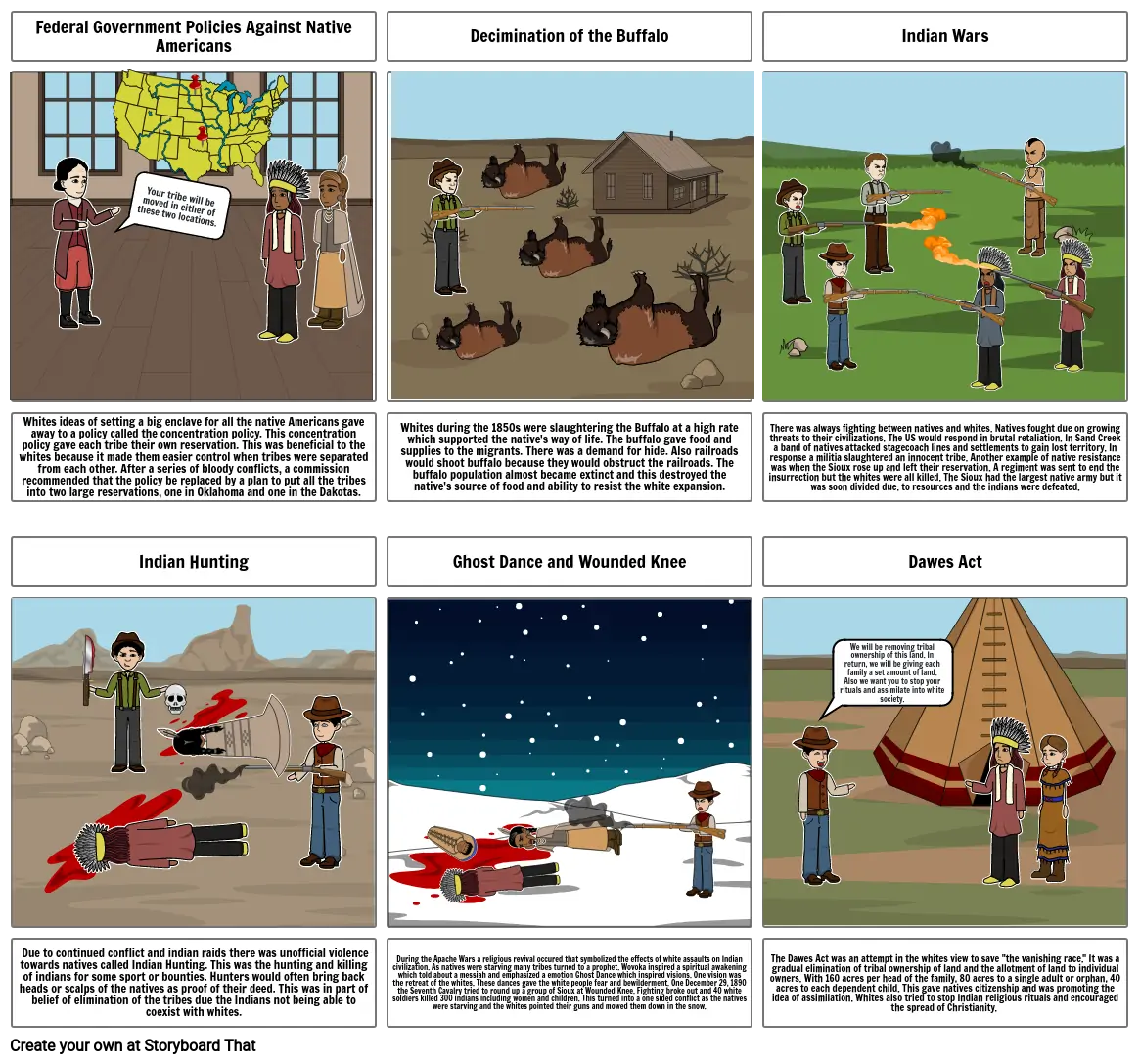Unknown Story

Snemalna Knjiga Besedilo
- Federal Government Policies Against Native Americans
- Your tribe will be moved in either of these two locations.
- Decimination of the Buffalo
- Indian Wars
- Whites ideas of setting a big enclave for all the native Americans gave away to a policy called the concentration policy. This concentration policy gave each tribe their own reservation. This was beneficial to the whites because it made them easier control when tribes were separated from each other. After a series of bloody conflicts, a commission recommended that the policy be replaced by a plan to put all the tribes into two large reservations, one in Oklahoma and one in the Dakotas.
- Indian Hunting
- Whites during the 1850s were slaughtering the Buffalo at a high rate which supported the native's way of life. The buffalo gave food and supplies to the migrants. There was a demand for hide. Also railroads would shoot buffalo because they would obstruct the railroads. The buffalo population almost became extinct and this destroyed the native's source of food and ability to resist the white expansion.
- Ghost Dance and Wounded Knee
- There was always fighting between natives and whites. Natives fought due on growing threats to their civilizations. The US would respond in brutal retaliation. In Sand Creek a band of natives attacked stagecoach lines and settlements to gain lost territory. In response a militia slaughtered an innocent tribe. Another example of native resistance was when the Sioux rose up and left their reservation. A regiment was sent to end the insurrection but the whites were all killed. The Sioux had the largest native army but it was soon divided due. to resources and the indians were defeated.
- Dawes Act
- We will be removing tribal ownership of this land. In return, we will be giving each family a set amount of land. Also we want you to stop your rituals and assimilate into white society.
- Due to continued conflict and indian raids there was unofficial violence towards natives called Indian Hunting. This was the hunting and killing of indians for some sport or bounties. Hunters would often bring back heads or scalps of the natives as proof of their deed. This was in part of belief of elimination of the tribes due the Indians not being able to coexist with whites.
- During the Apache Wars a religious revival occured that symbolized the effects of white assaults on Indian civilization. As natives were starving many tribes turned to a prophet. Wovoka inspired a spiritual awakening which told about a messiah and emphasized a emotion Ghost Dance which inspired visions. One vision was the retreat of the whites. These dances gave the white people fear and bewilderment. One December 29, 1890 the Seventh Cavalry tried to round up a group of Sioux at Wounded Knee. Fighting broke out and 40 white soldiers killed 300 indians including women and children. This turned into a one sided conflict as the natives were starving and the whites pointed their guns and mowed them down in the snow.
- The Dawes Act was an attempt in the whites view to save "the vanishing race." It was a gradual elimination of tribal ownership of land and the allotment of land to individual owners. With 160 acres per head of the family, 80 acres to a single adult or orphan, 40 acres to each dependent child. This gave natives citizenship and was promoting the idea of assimilation. Whites also tried to stop Indian religious rituals and encouraged the spread of Christianity.
Ustvarjenih več kot 30 milijonov snemalnih knjig

